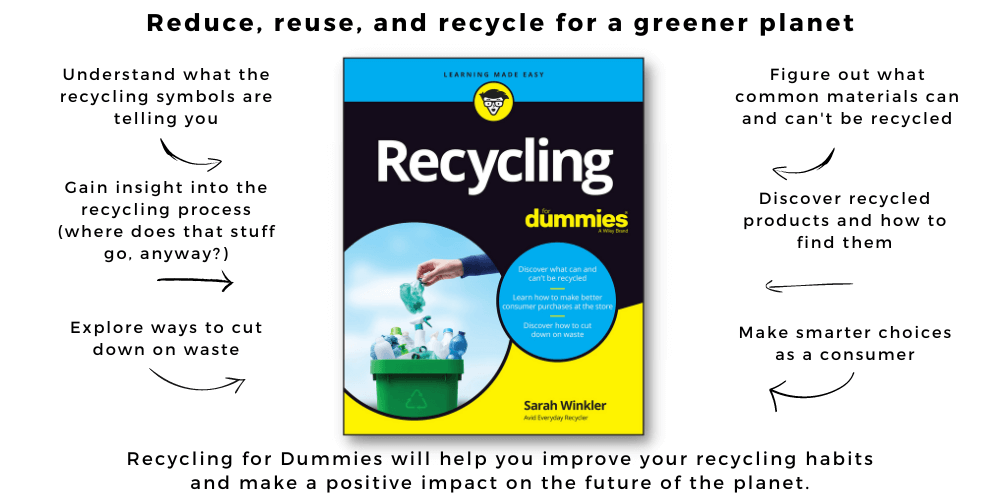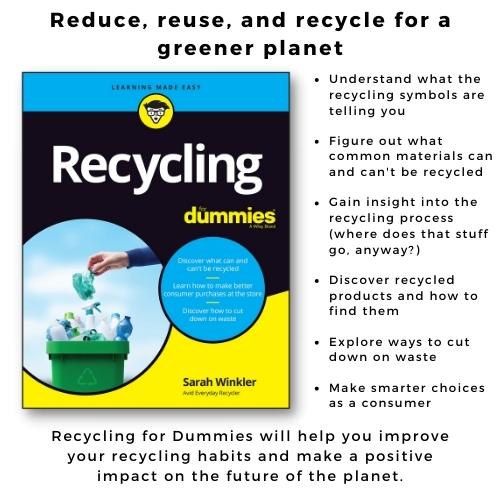

WHATS INSIDE
Part 1: Getting Started with Recycling
- Discover the essential skills to help you contribute to a successful and thriving recycling industry.
- Rummage in your bins to better understand waste.
- Realize the damage that too much waste inflicts on our parks and nature reserves, waterways and oceans, the air we breathe, and the animals with which we share the planet.
- Explore the recycling processes to discover what happens to our waste and if it really does get recycled.
Part 2: Grasping Curbside Recycling
- Master the basics of curbside recycling services by kicking bad habits.
- Figure out the many types of plastics and which ones belong in your recycling bin.
- See what resources are needed to make paper and cardboard and how they are recycled.
- Get the lowdown on glass recycling rules, why your area may not accept it, and what you can and can’t recycle.
- Discover how to identify different metals to recycle them more effectively.
- Examine multilayer materials to appreciate their advantages while considering the difficulties they present for recycling.
Part 3: Finding Solutions in Specialist Recycling
- Unpack soft plastics in detail: what they are, how to identify them, and where to recycle them.
- Check out the effects of food waste to learn why it’s the most significant issue in our trash cans, and how you can cut down how much you create.
- Bring to light the mounting crisis of electronic waste and find the tools to understand how your choices can help tackle the problem.
- Uncover the many other specialist recycling programs for things like mattresses, carpets, light bulbs, batteries, car tires, and even used diapers.
Part 4: Recycling won’t save the planet on its own
- Safeguard the planet for future generations by finding new ways to reduce, reuse, and recycle.
- Harness your consumer voting power and find out how you can start buying back your recycling.
- Get the latest tips and tricks on other ways you can get involved in solving the world’s waste problems.
- See what the future looks like. Hint: it includes intelligent robots, plastic-eating organisms, and powerful policies that drive change.
Part 5: The Part of Tens
- Investigate the answers to the ten most common recycling myths. Recycling works, but wishcycling is out, and so is putting your recycling in a plastic bag.
- Explore the ten things you thought you couldn’t recycle but you actually can — you might be surprised by what’s on this list.
- Discover ten things you thought you could recycle but can’t — getting acquainted with this list will help reduce contamination in your recycling bin.
Plus it includes plenty of actionable content and worksheets
Run your own waste audit or use the worksheets provided to check your local town or city government rules.
WHAT PEOPLE ARE SAYING ABOUT RECYCLING FOR DUMMIES
The Recycler’s bible: find all you need to know in one place.
This isn’t just a book about what you can recycle. It’s the story of why recycling is important, how it works – and why, on occasions, it doesn’t work. It’s inspirational: you’re never going to feel guilt-tripped into doing something you don’t want to do. You’re going to feel that it’s the sensible, the simple thing to do. There are even tips on how to reduce your food waste. That’s not just good for the planet, it helps the wallet too. There’s a simple approach: we’re told what can be recycled no matter where you live, what can’t be recycled in any curbside service and what you need to check to see what your local area accepts.
Sue Magee from THE BOOK BAG
This book goes into mind-boggling detail. I was learning on virtually every page.
In addition to going into great detail as to what you can recycle and how, an enormous strength of the book is encouraging other ways to help the environment that involve all the “stuff” that has become commonplace in our daily lives.
Absolutely recommend. You will learn.
DisneyDenizen
As governments around the world take on the challenge of creating a circular economy to address a deteriorating environment, escalating consumption and dwindling resources, we will all be expected to become more expert recyclers.
With helpful links and advice on how to make recycling easier at home, ‘Recycling for Dummies’ is essential reading for those looking for a deeper understanding of waste management and resource recovery, and ready to take greater personal responsibility for reducing their environmental footprint.
Peter Collins Sustainability Education Officer at Latrobe City Council
This book is thoughtful and helpful – the author did their research!
While finding what is recyclable in your areas curbside is one thing, what actually happens to the stuff that you send is another. Understanding and recognizing the material in packing and shipping material, groceries and other products we by is imperative to helping to save the planet. Wasting less is critical.
Bravo on the hard work and research put into this book. It’s a true must read for those interested in understanding how to leave less of a footprint.
I highly, highly recommend it!
Jennifer
Recycling: the simplest action you can take today to positively impact the planet!
“It’s not just about recycling that piece of plastic you hold in your hand; it’s about protecting our wildlife, cleaning up our planet, and reducing pollution and climate change impacts.”
“Just because an item displays the Mobius loop for recycling doesn’t mean it’s recyclable in your local area. Always check with your local town or city.”
“Changing how we perceive electronic gadgets and appreciating their worth is perhaps the most fundamental way to deal with our growing e-waste issue.”
“Remember the three key questions described in the section earlier: Is the plastic rigid or soft? What’s the plastic number? And Is it accepted in my local area?”
“Problems occur when we put the wrong items into our recycling bins. Food waste, textile and clothing waste, complex items like computers, or larger items like furniture don’t belong in your curbside recycling bin.”
ABOUT THE AUTHOR
Sarah Winkler is the founder of Everyday Recycler, an educational website that offers its readers simple and actionable recycling tips (www.everydayrecycler.com). Her mission is to create a world where recycled products are commonplace and waste is scarce.
Sarah holds an honors degree in science and postgraduate training in business analytics and the circular economy. She has spent more than 25 years working in various facets of project management, where her aptitude for developing reports, procedures, and training manuals has helped set many projects up for success. Through her varied project and life experience, she has developed an entrepreneurial style with strong conceptual thinking and problem-solving skills — skills she now applies to solve the world’s recycling questions.

Hi I'm Sarah Winkler
I wrote this book to help people find a way to cut through the confusion and discover a straightforward approach to recycling. I want to make it easier for people to make the right choices at the bin to ensure we get the most significant benefits from such a positive action.
I hope this book inspires you to improve your recycling habits and helps you understand how recycling can help solve our waste problems.
Buy RECYCLING FOR DUMMIES From
Your Favourite Retailer
If you are based in AUSTRALIA you can order directly from my website
SHARE THIS BOOK ON:
PRESS INQUIRIES & CONTACT INFORMATION
For press and publicity inquiries regarding Recycling for dummies, please contact [email protected]



